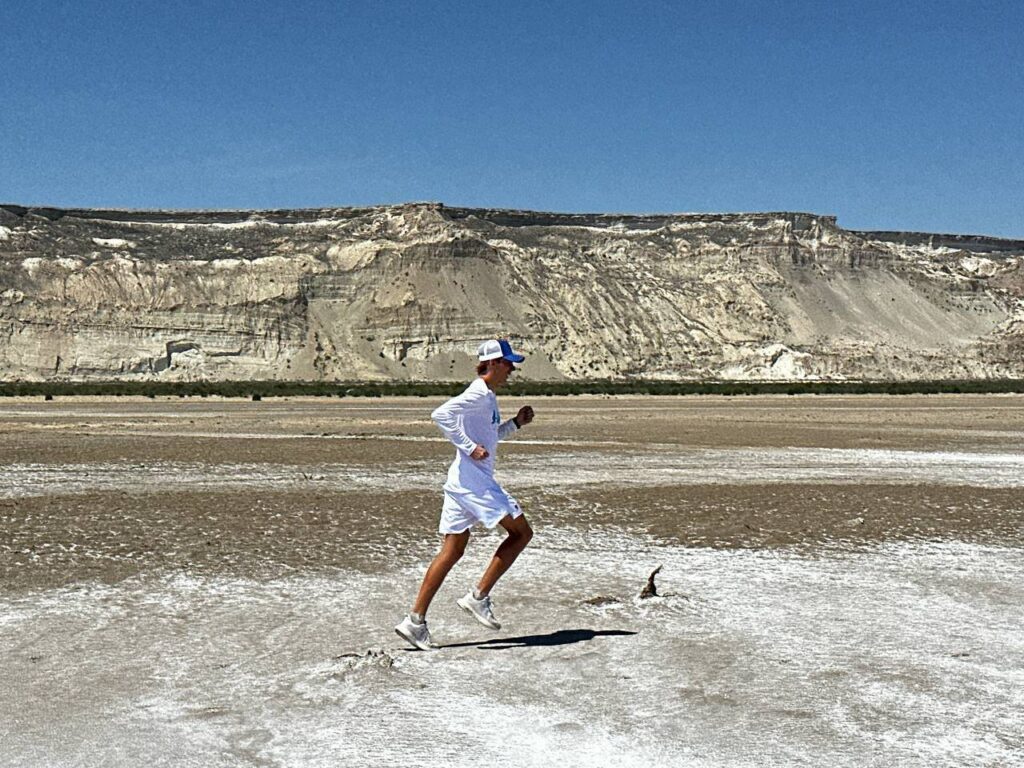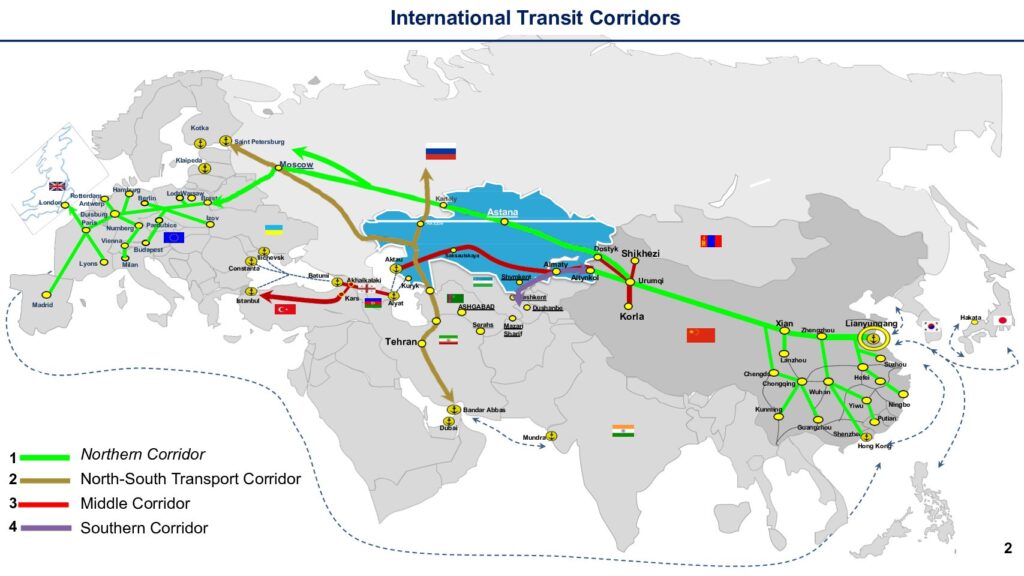Kazakhstan’s President Kassym-Jomart Tokayev has ordered alternative transportation and shipping routes to be drawn up and supply routes to be diversified. Amid ongoing geopolitical shifts, routes passing through Kazakhstan’s territory are already seeing relatively high freight flows. Still, to develop them, further measures are needed to enhance international logistics cooperation and increase efficiency along the entire length of the transport corridors.
The country’s deputy minister for transport Maksat Kaliakparov kindly agreed to answer some questions from The Times of Central Asia.
TCA: Not so long ago, Kazakhstan Temir Zholy (KTZ) announced the launch of a project to create a digital corridor as part of the Trans-Caspian International Transport Route (TITR) with the company Global DTC Pte Ltd. What countries are to be integrated into this project? Can a similar digital trade corridor be considered for the International North-South Transport Corridor (INSTC)?
MK: As you know, on August 16, 2022, KZT and the Singaporean company PSA concluded a memorandum according to which one of the identified areas for cooperation is developing a digital trading corridor (DTC).
Towards this, a multimodal DTC has been developed. Using this platform, three container trains were sent on the route from Xi’an (China) to Absheron (Azerbaijan) as a test run. Integration with the railway systems of Kazakhstan and Azerbaijan has been carried out. Currently, the process of integration with Georgian systems is underway.
Overall, the DTC platform allows for: entering into online contracts with freight forwarding companies; seeing and receiving transportation tariffs from logistics companies; tracking the location of containers along all routes; getting customs status based on transit declarations when crossing borders along the route, etc.
This year, it is also planning to launch the commercial operation of a container tracking service in Kazakhstan, Azerbaijan, and Georgia, and it is also planning to be integrated with a Chinese logistics operator.
In addition, the Tez Customs platform has been developed. It is part of DTC, created to automate the customs clearance process of railway transit freight on the route China-Kazakhstan-Central Asia/Europe. Tez Customs allows for: automating the process of customs transit clearance at the Kazakhstan-China border; reducing the time of customs procedures (from 4-8 hours to 30 minutes); tracking the status of transit declarations and freight until final departure from the territory of Kazakhstan.
Meanwhile, a similar DTC for the INSTC is being considered within the cooperation framework with the UAE company Abu Dhabi Ports.
TCA: As part of the development of the INSTC, the railway administrations of Kazakhstan, Russia, and Turkmenistan are planning to create a joint venture (JV). Tell us about the plans for how it is to be formed. How will shares in the JV be allocated between the countries?
MK: Yes, indeed, for the further development of the eastern branch of the INSTC, the participating countries are working to create an equal-term JV between KTZ Express, Russian Railways Logistics, and the Transport and Logistics Center of Turkmenistan.
Today, the railway administrations of Russia, Kazakhstan, Turkmenistan, and Iran are creating a favorable tariff environment for the INSTC. In addition, note that significant discounts on transit freight were already established on the territory of Kazakhstan starting on January 1, 2024.
Overall, to deepen transit and transportation cooperation, we welcome the interest of the Russian and Iranian sides in expanding the potential of the INSTC. For example, in May of this year, during the KazanForum: Russia-Islamic World International Economic Forum, a memorandum of understanding was signed between the Kazakhstani Ministry of Industry and Infrastructure Development and the Russian Ministry of Transport that provides for the deepening of cooperation regarding the INSTC.
We consider it important for Russia to actively participate in developing this unique transport artery with more intensive use of the Kazakhstan-Turkmenistan-Iran rail section.
Also, in 2022, a roadmap was drawn up for the synchronized development in 2024-25 of the potential of the eastern part of the INSTC, passing through Kazakhstan, Russia, Turkmenistan, and Iran territories. The document provides solutions to organizational issues, logistics services, and developing a unified tariff policy.
TCA: What can you say about the implementation of road infrastructure projects? How is the project for constructing a highway in the direction of the Temir Baba border crossing progressing within the context of Turkmenistan’s stated plans to build a new highway to the border with Kazakhstan?
MK: The realization of the project for the reconstruction of the republican-status highway Zhanaozen-Kendirli-Turkmenistan border to the Temir Baba vehicle checkpoint in Mangystau Region with a length of 165 km is planned for 2027-29. A loan from the Islamic Development Bank or the Development Bank of Kazakhstan will be raised to realize the project.
TCA: Today, large-scale work is being carried out in Kazakhstan to improve the rail, maritime, and road infrastructure. What work is being done in air and road transportation as part of the development of the INSTC and TITR?
MK: It should be noted here that work to expand the geography of flights from Kazakhstan, including the opening and resumption of direct flights from Kazakhstani cities to foreign countries, is constantly being done.
Today, international flights are operated to 28 countries (Azerbaijan, Armenia, Belarus, Germany, Georgia, Egypt, India, Iran, Italy, the UK, the Netherlands, Qatar, China, Kuwait, Kyrgyzstan, Mongolia, the UAE, Poland, Russia, Tajikistan, Thailand, Vietnam, Malaysia, Turkey, Uzbekistan, South Korea, Saudi Arabia and the Czech Republic) on 106 routes with a frequency of 574 flights per week.
In addition, Kazakhstan has had an open skies policy since 2022, under which foreign airlines are not restricted from operating flights to our country.
This year, regular flights from Kazakhstan have been opened and resumed to Mumbai, Beijing, Mineralnye Vody, Kuala Lumpur, Dushanbe, Prague, St Petersburg, Batumi, Sochi and Seoul.
As for international road transportation, e-permit forms have been introduced to develop transport corridors. This should eliminate the cost of producing [the forms] and sending them to a counterparty, simplify their distribution process, and, most importantly, facilitate the direct use of the permit forms by road freight carriers.
TCA: Tell us about developing alternative transport corridors for inland waterways in Kazakhstan. In particular, along the Ural River, taking into account the rising water level in the region and plans to resume shipping. Also, a new transport route connecting Russia and China is planned along the Irtysh River.
MK: The development of the multimodal transit corridor Russia-Kazakhstan-China using the transboundary Irtysh River is planned to be realized before 2026. For this purpose, it is planned to implement projects for the construction of an additional navigable hydraulic structure on the Pavlodar-Semey section, the Tugyl port in the East Kazakhstan Region, and the Tugyl-Maikapchagai railway, as well as for the opening of a fourth Maykapchagai-Zimunai rail checkpoint.
The investment size [needed for the] projects will be determined once the project documentation is developed and a potential investor is identified. Overall, the realization of this multimodal transit corridor is expected to increase freight volumes to 3.6 million tons a year.
We are also working on developing the Atyrau-Baku, and the Atyrau-Astrakhan routes through the Zhaiyk-Caspian Canal. The canal will be dredging in 2024-25 when navigation is open to realize these routes. The planned volume of freight is estimated at 2 million tons a year.
Dauren Moldakhmetov is the Editor-in-Chief of Kazakhstan’s industry transportation publications: the railway magazine “Trans-Express Kazakhstan” and the business magazine “Trans Logistics Kazakhstan.”









